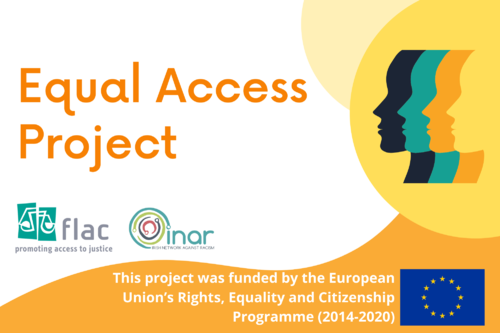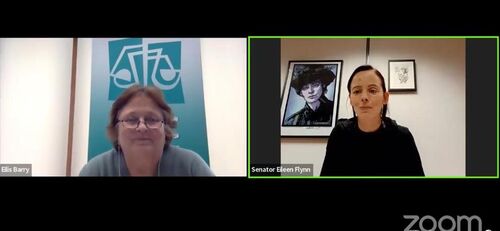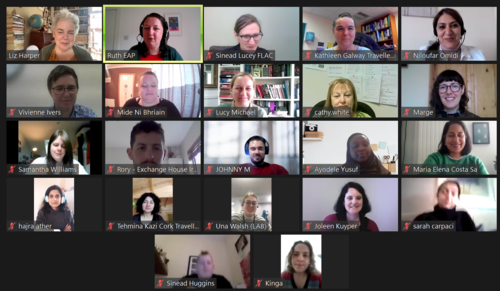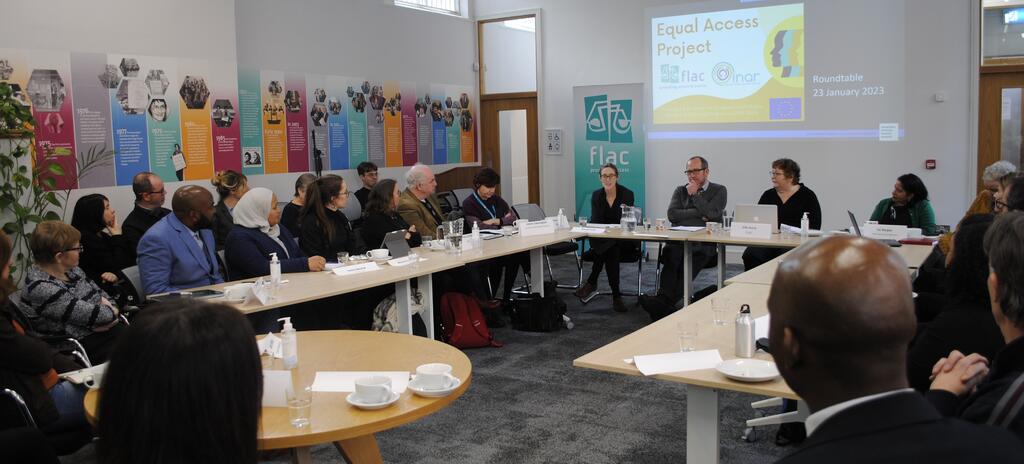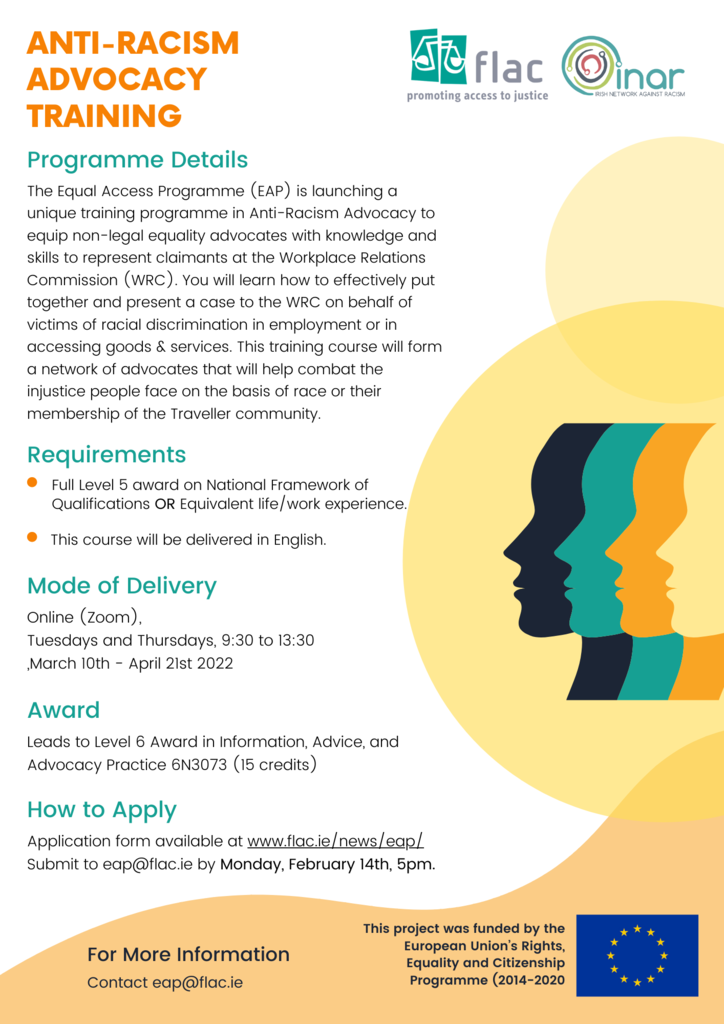The Equal Access Project
The Equal Access Project (‘EAP’) is a joint FLAC & INAR project funded by the European Union to improve access to justice for people who are subjected to discrimination on the basis of race or membership of the Traveller community, whether it is in employment or in accessing goods and services. People across Ireland face this kind of indignity and violation every day and the EAP seeks to respond to this injustice in two critical ways:
- Developing an accredited training programme in Anti-Racism Advocacy to equip non-legal advocates with the skills and knowledge to represent claimants on the race ground at the Workplace Relations Commission. The participants of this training will go on to implement what they have learned as a nationwide network of advocates supporting people in seeking justice.
- Commissioning a piece of empirical and analytical research into the transposition of the EU Race Directive into Irish law, and the effectiveness of the current infrastructure available to victims of racial discrimination to make complaints and to seek remedies. The research report will include policy recommendations that highlight areas for reform.
Official Launch of the Equal Access Project
On Wednesday 2 February, FLAC & INAR officially launched the Equal Access Project.
If you were unable to attend you can view the launch recording below
EAP Blog
#1 - FLAC and INAR Equal Access Project - Combatting Racism with Advocacy Training
by Ruth Kilcullen, EAP Project Coordinator
Since we launched the Equal Access Project at the start of February 2022, the project has taken off like a rocket. The launch event (recording available here) was a great opportunity to introduce the project and discuss the underlying issues that make this EAP so necessary. Access to justice for people subjected to racial discrimination in Ireland is blocked by complex barriers and the EAP will reveal those barriers and help affected people to navigate a way to justice. As well as a research component, a key part of the project is to train a network of advocates to have the skills and knowledge to accompany claimants taking a case of racial discrimination to the Workplace Relations Commission (WRC). To that end, the launch was also an information event to let people know about our Anti-Racism Advocacy Training Programme and recruit participants.
The training programme began on March 10th and ran until April 21st. There was a lot of interest from prospective trainees and, in the end, 22 people were invited to participate. Our trainees come from all across Ireland. They are already working in various capacities to advocate for the rights of communities affected by racial discrimination, and come from backgrounds in law, healthcare, community development, education, youth work, and more. Thanks to our funding from the EU Rights, Equality, and Citizenship Programme (2014-2020) we were able to deliver this training at no cost to the participants, except for their notepad and pencil. The EAP team developed a programme that deals with how to understand and respond to racism as well as the intricacies of relevant legislation and the workings of the WRC. A brilliant team of trainers was brought together to lend their expertise to this programme and develop engaging and challenging sessions for our trainees. These included in-house experts from FLAC and INAR, as well as academics and legal practitioners. Some of the topics covered include advocacy skills, models of equality, EU and national equality legislation, and WRC practice and procedure.
It often comes as a surprise to people to find out that the WRC is the body responsible for dealing with cases of discrimination on the race ground in employment and access to goods and services. It seems very counter-intuitive that an agency with that name would be the place to go if you are refused service in your local newsagent’s on the basis of race, or if you are discriminated against at passport control in Dublin airport. This is one of the first barriers people come up against; knowing where to go to make a complaint. That’s why the EAP Anti-Racism Advocacy training was designed to equip our learners with step-by-step knowledge of the process. It is crucial to demystify the complaints process and support as many people as possible to explore their options when they have been mistreated on the basis of race or membership of the Traveller community.
It can be very daunting for people without access to legal representation to make a complaint to the WRC. It is our goal to enable advocates to support people in taking their case so they are not facing this complex process alone. This kind of advocacy will increase positive outcomes for people taking cases. Of course, effective advocacy doesn’t only involve taking and winning a case at the WRC. It includes providing all the relevant information and laying out all the options. It requires listening to a client and supporting them in making the best decision for themselves in how to proceed, which might not always be taking a case. The rights and wellbeing of the affected person will always be at the centre of the work of an anti-racism advocate, and our trainees are well-placed within a diverse range of organisations around the country to support people subjected to racial discrimination.
Feedback from the training participants indicates that the course fills a crucial information gap and has been an empowering experience for them. This is the only programme of its kind in Ireland at the moment, and our objective is that it will be delivered again in the future to build this network of anti-racism advocates.
EAP Blog 2
#2 - Anti Racism Advocacy
by Úna Walsh – Clerical Officer with the Legal Aid Board
I came to know about the Equal Access programme through an email sent from the FLAC - Free Legal Advice Centres to my workplace, the Legal Aid Board.. I was interested in the programme as it aimed to improve access to justice for those who are subject to discrimination, on the basis of race or being a member of the Traveller community, whether that be through employment or in accessing goods and services. Part of my role within the Legal Aid Board is to aid in the provision of civil legal aid and arranging advice consultations, essentially providing access to justice for those who are of a low-income. During my time in the Legal Aid Board, I have encountered clients who have enquired about taking cases to the Workplace Relations Commission and I always felt that l was ill-equipped to talk about the process and to direct clients as Legal Aid does not cover Workplace Relations Commission cases. I felt this programme would provide me with an invaluable opportunity to develop important new skills, in advocacy, advice and information provision.
While I had been previously aware of the Workplace Relations Commission and its service, I was completely unaware of the complaint process and the different legislative acts involved. Also, while I was aware of FLAC, I was not aware of the other organisation behind this joint project, INAR nor was I aware of the work that INAR does.
Now, upon completion of the programme, I feel as though I have a comprehensive understanding of the relevant sections of the Equal Status Acts, the Employment Equality Act and the Intoxicating Liquor Act, necessary in taking a case of racial discrimination to the WRC. During the programme, we received a large amount of theoretical notes, practical exercise sheets and real-life scenario problem questions that will be paramount in retaining my new skills going forward.
I have learned about the different types of advocacy, the ethics and scope of the role of an advocate, how to prepare for a Workplace Relations Commission case on the nine grounds set out under the Equal Status Acts; requesting and obtaining information under the Data Protection Act 2018 and the Freedom of Information Act, and pointers on structuring a first consultation with a client among many other topics.
Other topics that we covered during the programme included, the different grounds of discrimination that cases could be taken on, the exceptions and exemptions under equality legislation, how to take instructions from a client, investigation into the respondent, reasonable accommodation required of employers, and the process of written notification to the respondent.
What I found most enjoyable was the practical exercises. We were given the opportunity to put together a submission for a hypothetical case study and present as an advocate on behalf of our client. I enjoyed this as it gave me an opportunity to utilise the skills I had been developing over the course of the programme. As part of the final programme assessment we were obliged to prepare an argument in a group negotiation setting on behalf of members of the Traveller community.
This programme was important as it highlighted to me my own generational prejudices towards the Traveller community, how a majority of the Irish population might feel this way and how this view affects Travellers in their day to day lives. I do truly believe that this course has dismantled my previous prejudices and I now understand how important it is for me now, as an advocate, to highlight the injustices that the Traveller community and indeed all marginalised and minority groups face in their day to day lives.
The aim of this training is that all of us as participants will go on to implement what we have learned as a nationwide advocacy network supporting those who are seeking justice. I hope that we can continue to pass on the quality information that we have received as part of this programme.
Having completed this programme at what is essentially the start of my career, I now have insight into other potential careers that exist and this has been extremely beneficial to me.
I now feel equipped to guide and advocate future potential clients through the Workplace Relations Commission process and impart information on different aspects of the process.
Overall, I now feel as though I have further enhanced my information provision, advice and advocacy skills and I am delighted to have taken part in the programme. I would recommend it to anyone wanting to develop a new skill or to learn more about taking a case of racial discrimination to the Workplace Relations Commission.
EAP Blog #3
EAP Goes to Brussels
by Ruth Kilcullen, EAP Project Coordinator
On March 21st, the EAP project team is heading to Brussels to meet with activists and other stakeholders from around Europe. The team will be joined by Lucy Michael, an independent expert in equality issues, who is conducting a significant new piece of research for the EAP. Lucy’s research focuses on the implementation of the EU Race Directive in Ireland. Under this Directive, the Irish state has certain obligations to ensure access to justice for people who are discriminated against on the basis of race or membership of the Traveller Community. Lucy’s research shows that despite these obligations, there are many barriers to justice for members of minoritised communities facing discrimination in employment and access to goods and services. The EAP is convening a roundtable in Brussels at 3pm on the 21st of March at the European Parliament in Brussels to share the key findings of this crucial research with equality activists, politicians, and representatives of international organisations fighting racism.
A similar event was held in Dublin in January with representatives from across Irish civil society, including AkiDwa, the Citizens Information Board, the Irish Human Rights and Equality Commission, and SIPTU. The participants heard from Lucy Michael about her team’s analysis of racial discrimination cases taken to the Workplace Relations Commission, and the various challenges complainants face in accessing justice. The EAP research reveals a complex of obstacles in the Irish system for people seeking to hold employers and providers of goods and services to account for racial discrimination.
Following Lucy’s presentation, Sinead Lucey of the EAP team introduced participants to the EAP’s Anti-Racism Advocacy training programme. This initiative is an important response to some of the issues highlighted in the EAP research. The Anti-Racism Advocacy training was successfully delivered for the first time last year, and equipped the trainees with the knowledge and skills to provide information and advice to people facing discrimination on the Race and Traveller Community grounds. The provision of this kind of training is crucial to developing the capacity of advocates working to uphold the rights of minoritised communities across Ireland through effective advocacy. With the support of organisations represented at the EAP roundtable, this Anti-Racism Advocacy training can and should be provided to advocates across the country so that confidence in our justice system can be rehabilitated and victims of racial discrimination can be protected.
This training programme also provides a valuable model for other European countries. Although the legal frameworks for dealing with racial discrimination cases may vary from country to country, every EU member state is obliged to implement the Race Directive. The Directive requires governments to establish equality bodies that offer assistance to victims pursuing a legal remedy to discrimination, but the low number of such cases in Ireland suggests that affected members of the public are not receiving the information and assistance they need. Targeted training to build the capacity of advocates is a crucial measure to meet that need. Where similar challenges arise in other EU states, the provision of training to advocates so that they can help people assert their rights under the Race Directive is critical. Sharing the lessons we have learned and exchanging knowledge of best practices in this area will be a key outcome of the EAP roundtable in Brussels, a gathering of stakeholders from around Europe who are all working to ensure the full implementation of the Race Directive in their home countries, and protect and vindicate the rights of minoritised peoples.
The EAP research report will be published in the coming weeks, so keep an eye on our website for further updates.
Anti-Racism Advocacy Training
The EAP launched a unique free training programme in Anti-Racism Advocacy to equip non-legal equality advocates with the knowledge and skills to represent claimants at the Workplace Relations Commission. Students will learn how to effectively put together and present a case to the WRC on behalf of someone who has been subjected to racial discrimination in employment or in accessing goods and services.
*Please note this training has commenced and is no longer accepting applications.
Anti-Racism Advocacy Training Testimonials
The training element of FLAC & INAR Ireland's Equal Access Project is now complete. Listen to course participants Rory O'Connell, Exchange House Ireland and Tehmina Kazi, Traveller Visibility Group Cork on why they signed up. We are now looking forward to the next phase of network building & learning application #EAP2022
